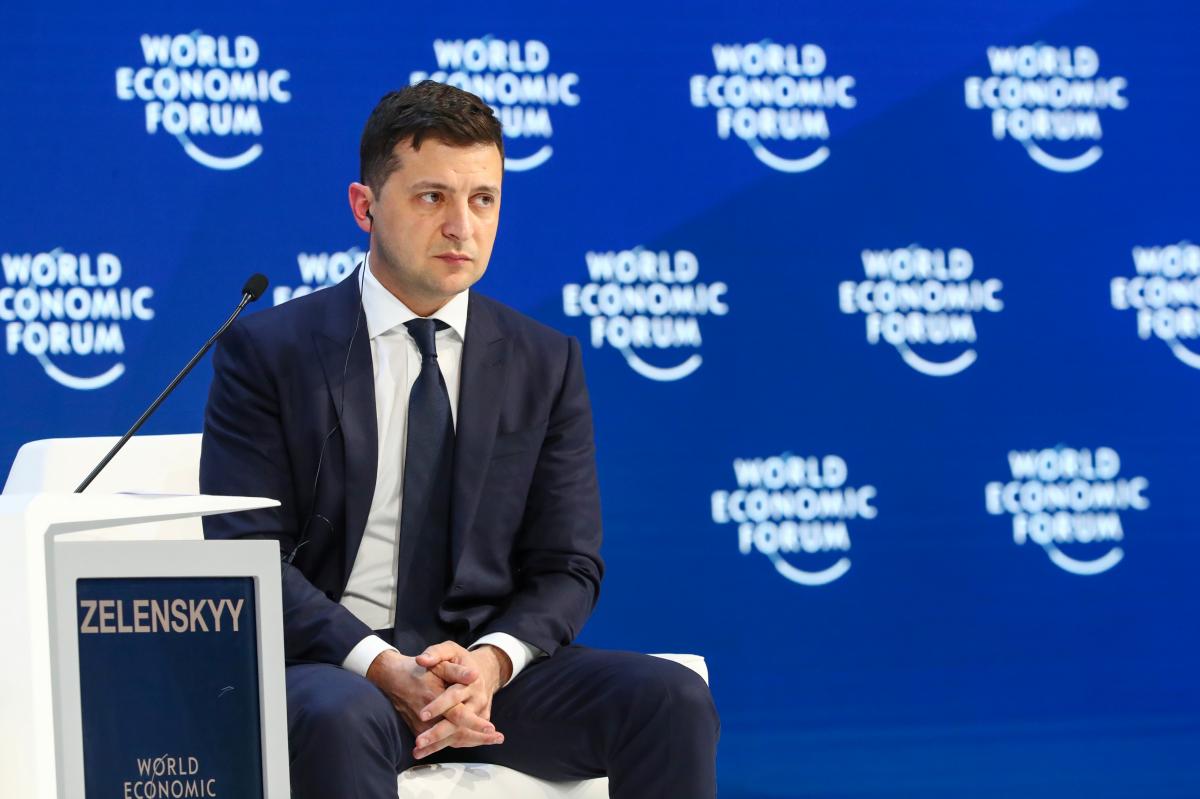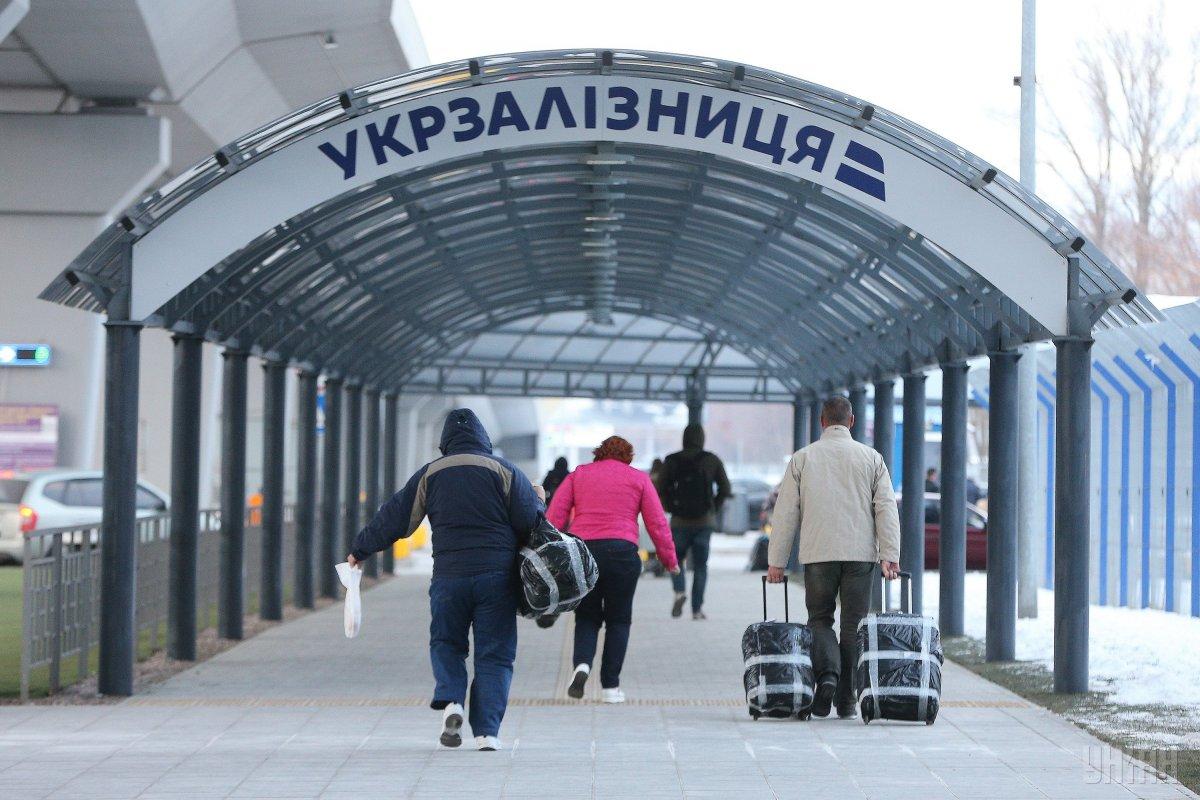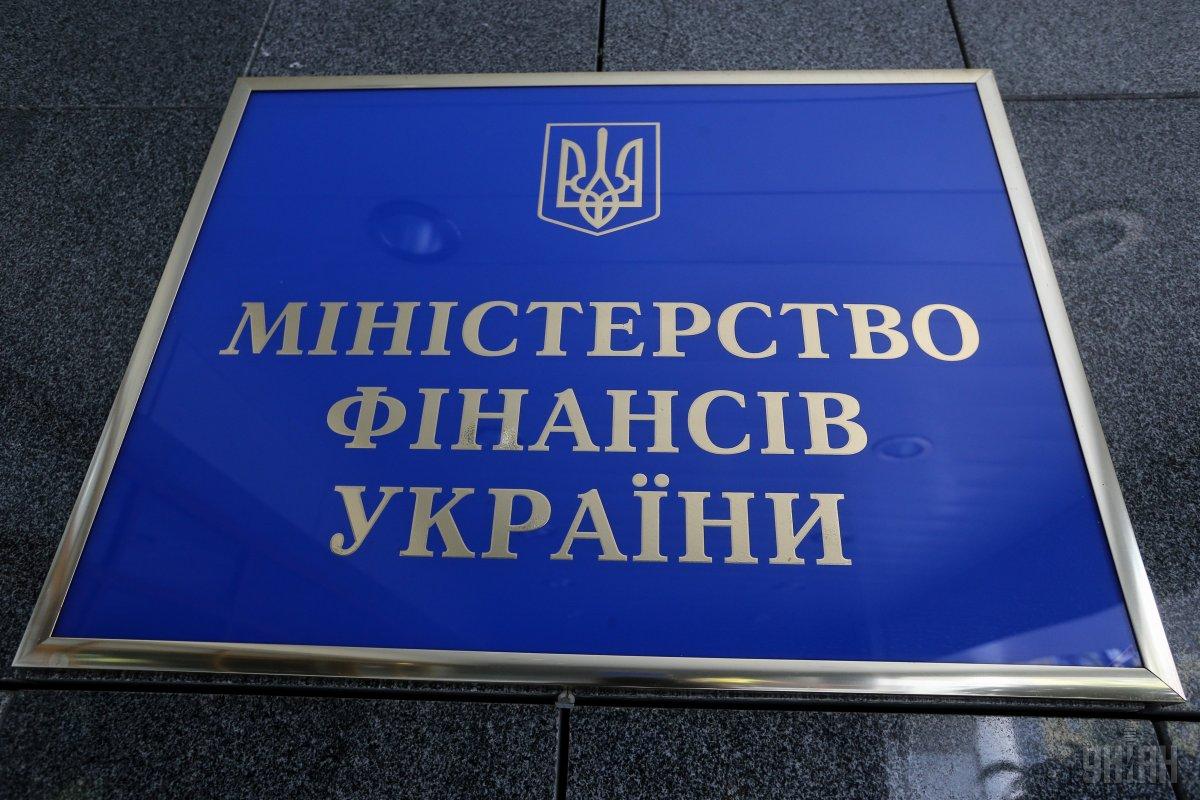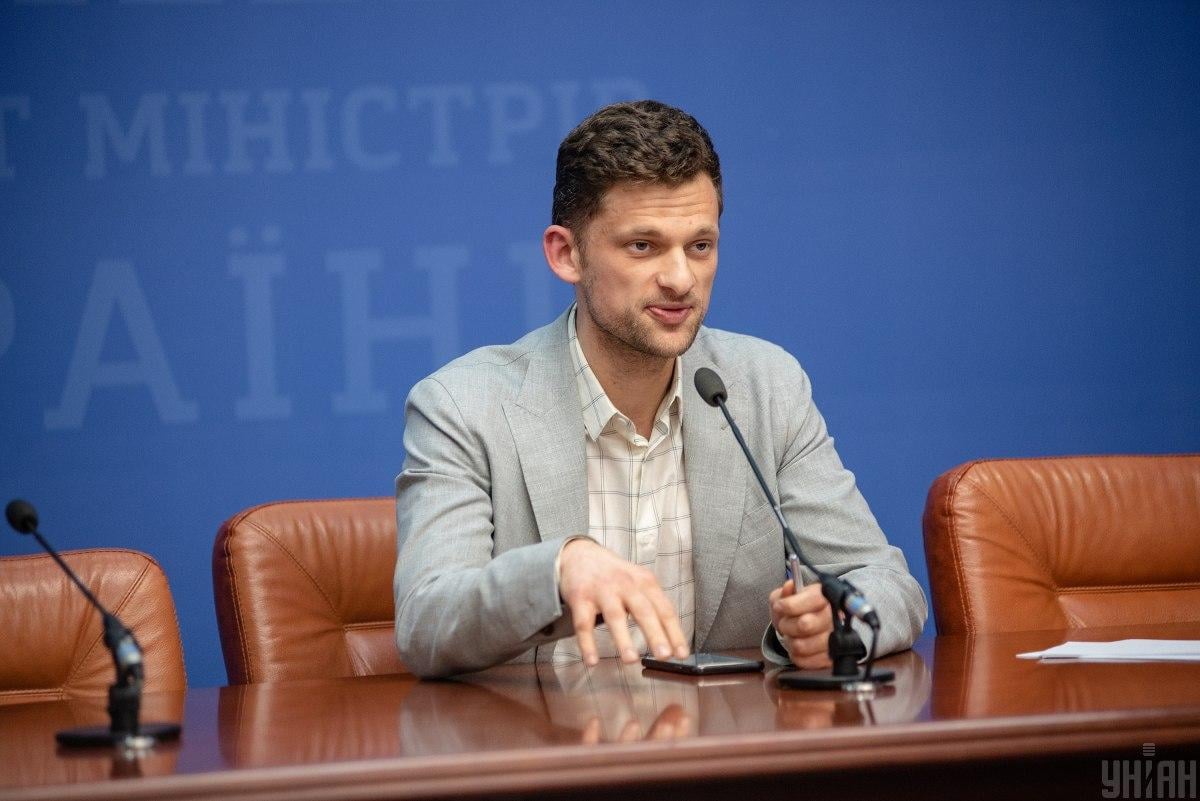
Week's balance: Zelensky vows to get investors a "nanny", while Ukraine issues eurobonds and releases population count data
President of Ukraine Volodymyr Zelensky at the World Economic Forum in Davos jokingly promised to get foreign investors a "nanny" in Ukraine, the finance ministry made a new Eurobond issue worth EUR 1.25 billion at a record low rate, while the government applied new methodology in counting the country's population – these are the main economic developments of the outgoing week.
Ukraine and the rest of the world watched the most important economic news come from Davos, Switzerland, where the annual World Economic Forum was held this week. Led by President Volodymyr Zelensky, Ukraine's delegation also included Prime Minister Oleksiy Honcharuk, as well as a number of ministers and legislators.
During his address, Zelensky said Ukraine's task was to gain leadership in Eastern and Central Europe. Either jokingly or seriously, he also suggested that the EU take Ukraine in instead of the UK following Brexit.
An important statement by the president was for foreign investors to bring in Ukraine money and technology. Zelensky complained that Ukraine was "underinvested" and "not enough liked", promised to provide "nannies" to large foreign investors, and also to exempt from income tax for two years participants in the renewed privatization process if they invest at least $100 million.

"We will provide a separate contract with the state for each investor, a large company that will bring $100 million or more to Ukraine. It is the state that will protect you. You will have a manager, an investment nanny. This is a manager who speaks five languages, and this manager will work with you 24/7. Any question, any problem… You will be in touch with your manager and there will be no problems," Zelensky promised.
Anticipating outrage over unequal business conditions, PM Honcharuk said the state-sponsored Investment Nanny program would also apply to businesses already operating in Ukraine. At the Forum in Davos, the head of government also said the Rada will imminently pass legislation giving his Cabinet more powers required to "address issues of investors' concern," including tax preferences, land issues, and infrastructure.
The initiative of the country's leaders to create a comfortable environment for "elite business circles" did not particularly resonate with a number of experts in Ukraine who suggested that the authorities better improve the business climate in the country, ensure a truly independent and corruption-free judiciary, and once and for all cease unjustified law enforcement raids on businesses.
"If we want to address the issue systemically rather than assist chosen investors in manual mode, key problems must be resolved with the courts and law enforcement. Reform of the SBU, setting up a new financial investigation service, and judicial reform," said Serhiy Fursa, an expert with Dragon Capital Investment Company.
Oleksandr Parashchiy, head of the analytical department at Concorde Capital, believes that the "investment nanny" initiative is a sign that in general the situation with the investment climate in Ukraine is unlikely to change for the better.
"Why are all these investment nannies a bad sign? That's because the government is sending a signal to all of us – don't expect any improvement in the investment climate. The authorities are only able to set up for the chosen ones and 'investment AC', while all the rest will keep on dwelling in the already developed investment-climatic conditions," the expert emphasized.
Also in Davos, Ukrainian politicians and officials held a series of meetings, of which the most important one was between Zelensky and IMF Managing Director Kristalina Georgieva. Following their meeting, the Fund noted the progress in Ukraine fulfilling the conditions for launching a new cooperation program. In particular, in reforming the judiciary, increasing respect for the law, and achieving economic growth. Georgieva emphasized the importance for Kyiv to complete its "homework" to have the new cooperation program considered by the IMF Executive Board.
German consultants for Ukrzaliznytsia railway operator

The Forum in Davos was also marked by a rather sensational agreement reached between the Ministry of Infrastructure of Ukraine and Germany's largest railway operator Deutsche Bahn to attract German experts to reforming Ukrzaliznytsia.
Initially, PM Honcharuk assured that the state would retain control over the country's railways, while German experts would reform management mechanisms. However, the next day, Honcharuk delivered a shocker that the Ukrainian railways will be "handed over" to Deutsche Bahn for ten years.
However, he immediately specified that this was only a political decision by the government. After all, negotiations would have to continue to agree on the details.
The statement caused some stir in Ukrainian media as a wave of questions arose amid misunderstanding. Neither Ukrzaliznytsia nor the infrastructure ministry officials, whom UNIAN asked for a comment, were aware of the transfer of Ukrainian railways to the management of the foreign company, whose shareholder is another country's government.
Parliamentarians from the relevant transport committee were also clueless. Its deputy chair Yulia Klymenko said that the government alone could not hand over Ukrzaliznytsia to Deutsche Bahn's management because it is a strategic asset worth 5% of Ukraine's GDP.
Infrastructure Minister Vladyslav Kryklii tried to save the prime minister from the media blow, stating that at this stage the government is attracting Deutsche Bahn to cooperation and development of Ukrzaliznytsia as an advisor. Although in the future, the status may change. The minister said that Ukraine will consult with German experts, in particular, in two areas: the development of passenger and freight transportation.
"Infrastructure is a component that is always in state ownership. Passenger and freight transportation – indeed, this is a separate scenario. But it's too early to talk about it," said Kryklii.
Later, Deutsche Bahn in turn announced that the company was not planning to take Ukrzaliznytsia into own management.
New eurobond issue

An important economic news of the past week was the Ministry of Finance making this year's first issue of eurobonds, denominated in euro and maturing in 10 years. The total volume amounted to EUR 1.25 billion at a record low rate of 4.375%.
"Thanks to this effective solution, we are saving UAH 2 million per day for the state budget," PM Honcharuk said. The Prime Minister recalled that until 2022 Ukraine was forced to annually allocate about UAH 484 billion from the state budget to service the public debt.
Raiffeisen Bank Aval's senior analyst Mykhailo Rebryk believes that the placement of eurobonds will have a neutral and positive effect on the Ukrainian financial market. According to him, the euro in the course of payments on debts is likely to be converted into a dollar bypassing the market – through the National Bank, which will not lead to pressure on the hryvnia exchange rate. Experts also expect that the placement may simplify and reduce the cost of entry into the eurobonds market for Ukrainian companies.
In addition to external bonds, the Ministry of Finance plans to borrow money on the domestic market. Most likely, the next bidding will take place January 28, where for the first time hryvnia securities will be offered to investors for a 7-year circulation period. Experts predict that such a step increases the likelihood of another hryvnia strengthening.
Population count
Minister Dmytro Dubilet this week presented the results of the population count, an important indicator for forecasting the economic and social situation. As of December 1, some 37.29 million people resided in Ukraine, of whom 10%, 3.7 million, live in the capital city of Kyiv.
Gender distribution is as follows: 20.01 million women, 17.28 million men.
Government estimates do not include people permanently residing abroad and in territories temporarily beyond government control. The minister also said that whereas a traditional census would cost UAH 3.4 billion, the latest count was a cheap alternative. Three methods were used to estimate the population of Ukraine. First of all, mobile operators gave the government anonymous information about the total number of subscribers in the territory. Secondly, the Cabinet considered the Pension Fund's data and scooped up figures from the State Statistics Service and state registers. Thirdly, the government processed data from the state register of individuals. Then they "cleaned" the base based on income, pensions, social benefits, subsidies, and also supplemented the list with data from the passport database. Fertility, mortality, emigration and immigration statistics were also taken into account.
According to Dubilet, all the methods used gave approximately the same result with a marginal error of 2.86%. Therefore, it can be stated that over the years of independence of Ukraine, the population decreased by 15 million. The results obtained change many statistical indicators. The fact is that a few days ago the State Statistics Service claimed that the population of Ukraine was almost 42 million. In addition, the new estimate changes the calculation of GDP per capita. Economists have already calculated that the new data mean every citizen has become "wealthier" by $500 to $1000.

"$4,200. This is an actual GDP per capita for 2019. Not $3,700, as some economists thought. An additional $500 from the remote count," said Dmytro Boyarchuk, director of Case Ukraine Analytical Group.
Coordinator of NBU expert platform Andriy Blinov estimated the growth at $1,000. "After revaluing and specifying the population stats, Ukraine's nominal GDP per capita jumped from around $3,100 in 2018 to about $4,100 in 2019," he said.
The specified stats are changing other approaches, based on which state bodies shape their activities. This will affect, for example, the employment service, which receives state funding for 42 million people, not 38 million.
Industrial output drop and increased trade

The State Statistics Service this week reported the decline in industrial output as of the end of 2019 at 1.8% on year against growth a year earlier. Compared to November 2019, industrial output in December slid by 1.1%. The largest decline was recorded in the production of electrical equipment, textile industry, production of motor vehicles, woodworking industry, mechanical engineering, as well as production of coke and petroleum products. The largest growth in annual terms was recorded in pharmaceuticals, production of computers, electronic and optical products, chemical industry, extraction of crude oil and natural gas, and production of other machinery and equipment.
In the penultimate week of January, the State Statistics Service also reported on other important economic indicators. In particular, the retail trade turnover in Ukraine in 2019 increased by 10.5% compared to 2018, while agricultural production last year grew by 1.1%.
Next week the National Bank will be holding a board meeting on monetary issues, where, according to market expectations, the key rate could be cut significantly.
Oleksandr Kunytsky

